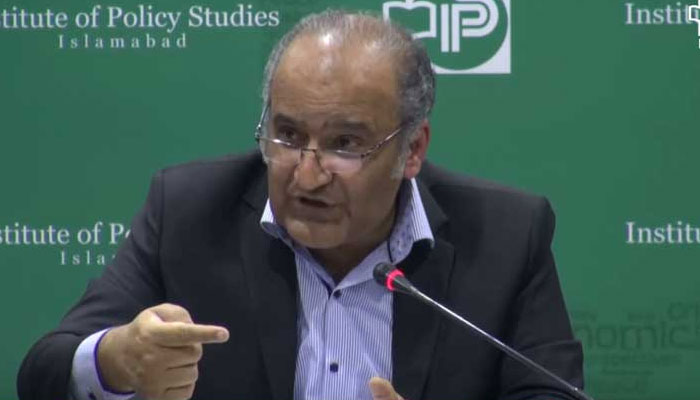‘Minorities in India may get respite after polls’
Islamabad: Dr Mujeeb Afzal, School of Politics and International Relations, Quaid-i-Azam University, has said that minorities in India may get a respite from a decade of marginalisation by BJP, as the much enhanced vote for the opposition in the elections has limited the BJP’s ability to make constitutional amendments to undo secular clauses.
Dr Mujeeb was participating in a panel discussion on “Implications of Indian elections” organised by Institute of Regional Studies here Friday.
Prof Mujeeb said that the election results suggest a return to Vajpayee era in India where the process of reforms would continue but without the total dominance of a single party, the BJP. He also asserted that the popularity of Rahul and Priyanka would significantly increase in the near future as they have emerged as symbols of the Constitution and protectors of minority and marginalised rights, especially after the two yatras before the elections.
On the foreign policy front, Dr Mujeeb mentioned that there would be no significant clash between the two power centers that emerged in the recent elections, the BJP-NDA and the Congress-INDIA alliances. In that sense, the Kashmir issue would continue to be a challenge between Pakistan and India, he concluded.
Dr Arshi Saleem Hashmi, Dean, Faculty of Contemporary Studies, National Defence University, questioned the BJP's newfound assertion that “democracy wins in India” following the disappointing voter turnout in the recent elections. She noted that India, the so-called world's largest democracy, still falls short of meeting the objective criteria of democracy.
She emphasised that Indian democracy is facing serious challenges of internal cohesion, primarily stemming from deep-rooted polarisation within social and political realms.
Dr Qamar Cheema, Executive Director, Sanober Institute, expressed optimism about the potentials for normalisation between Pakistan and India. He stated that there are chances India might open up to Pakistan, as Modi in his third term is expected to prioritise his “Neighborhood First” policy since this policy did produce tangible results in terms of partnerships with its immediate neighbours primarily due to neglect by the Centre in the past.
Earlier, Jauhar Saleem, President IRS, said that Modi's hyper-nationalist achievements, including the revocation of Occupied Kashmir's autonomy, implementation of a discriminatory citizenship law, and construction of the Ram temple, proved to be ineffective in terms of Prime Minister Modi’s ambitions for a two thirds majority with his allies reflected by the election slogan "Ab ki baar 400 paar" (this time 400 plus). BJP suffered a stunning setback in Uttar Pradesh, India’s largest state considered Hindu heartland where the much-hyped Ram temple was recently built. Mr Saleem noted that Nirendera Modi's approach towards Muslims and Pakistan may witness less hate mongering rhetoric since his anti-Pakistan stance during the elections did not significantly help in bolstering his voter base.
-
 Hong Kong Court Sentences Media Tycoon Jimmy Lai To 20-years: Full List Of Charges Explained
Hong Kong Court Sentences Media Tycoon Jimmy Lai To 20-years: Full List Of Charges Explained -
 Coffee Reduces Cancer Risk, Research Suggests
Coffee Reduces Cancer Risk, Research Suggests -
 Katie Price Defends Marriage To Lee Andrews After Receiving Multiple Warnings
Katie Price Defends Marriage To Lee Andrews After Receiving Multiple Warnings -
 Seahawks Super Bowl Victory Parade 2026: Schedule, Route & Seattle Celebration Plans
Seahawks Super Bowl Victory Parade 2026: Schedule, Route & Seattle Celebration Plans -
 Keto Diet Emerges As Key To Alzheimer's Cure
Keto Diet Emerges As Key To Alzheimer's Cure -
 Chris Brown Reacts To Bad Bunny's Super Bowl LX Halftime Performance
Chris Brown Reacts To Bad Bunny's Super Bowl LX Halftime Performance -
 Trump Passes Verdict On Bad Bunny’s Super Bowl Halftime Show
Trump Passes Verdict On Bad Bunny’s Super Bowl Halftime Show -
 Super Bowl 2026 Live: Seahawks Defeat Patriots 29-13 To Win Super Bowl LX
Super Bowl 2026 Live: Seahawks Defeat Patriots 29-13 To Win Super Bowl LX -
 Kim Kardashian And Lewis Hamilton Make First Public Appearance As A Couple At Super Bowl 2026
Kim Kardashian And Lewis Hamilton Make First Public Appearance As A Couple At Super Bowl 2026 -
 Romeo And Cruz Beckham Subtly Roast Brooklyn With New Family Tattoos
Romeo And Cruz Beckham Subtly Roast Brooklyn With New Family Tattoos -
 Meghan Markle Called Out For Unturthful Comment About Queen Curtsy
Meghan Markle Called Out For Unturthful Comment About Queen Curtsy -
 Bad Bunny Headlines Super Bowl With Hits, Dancers And Celebrity Guests
Bad Bunny Headlines Super Bowl With Hits, Dancers And Celebrity Guests -
 Insiders Weigh In On Kim Kardashian And Lewis Hamilton's Relationship
Insiders Weigh In On Kim Kardashian And Lewis Hamilton's Relationship -
 Prince William, Kate Middleton Private Time At Posh French Location Laid Bare
Prince William, Kate Middleton Private Time At Posh French Location Laid Bare -
 Stefon Diggs Family Explained: How Many Children The Patriots Star Has And With Whom
Stefon Diggs Family Explained: How Many Children The Patriots Star Has And With Whom -
 ‘Narcissist’ Andrew Still Feels ‘invincible’ After Exile
‘Narcissist’ Andrew Still Feels ‘invincible’ After Exile




